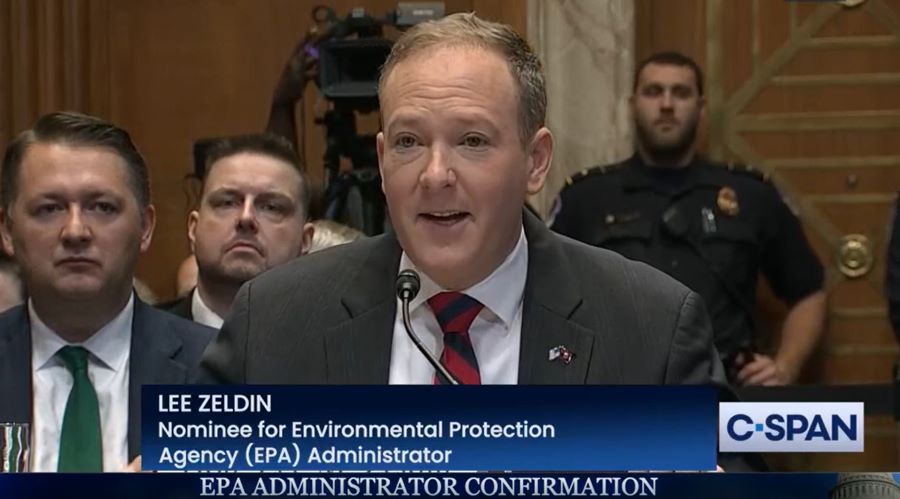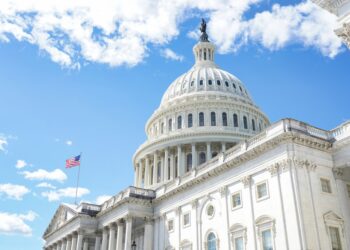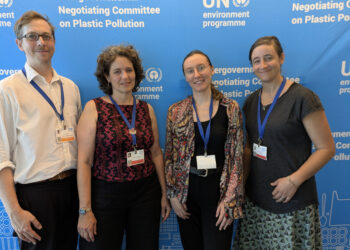During a three-hour confirmation hearing, President Donald Trump’s pick for U.S. EPA administrator said he is still learning about chemical recycling, praised the marine debris-focused Save Our Seas Act as a model of bipartisan plastic pollution legislation and said PFAS regulation will be a “big issue” for him.
Lee Zeldin, a Republican and former U.S. representative from New York, was nominated for the job in November. If confirmed, he would lead the government agency that has historically been closest to the recycling sector.
After Zeldin’s Jan. 16 confirmation before the Senate Environment and Public Works Committee, the group voted by 11-8 on Jan. 23 to recommend his confirmation. His nomination will now go before the full Senate for a vote.
EPA oversees a variety of recycling data collection and reporting projects, producing the periodic Facts and Figures report that provides a national look at waste generation and diversion. The agency also administers numerous grant programs for materials recovery. Among those are grants made possible by the Bipartisan Infrastructure Law – which, like the Inflation Reduction Act, had its spending paused by Trump’s Jan. 20 “Unleashing American Energy” executive order.
More recently, EPA has led a national plastic pollution planning effort. The agency in November released a National Strategy to Prevent Plastic Pollution, laying out a roadmap for the country to improve management of end-of-life plastics.
The agency was led by Michael Regan, former secretary of the North Carolina Department of Environmental Quality, throughout President Joe Biden’s term, leaving the post at the end of 2024. It is currently led by acting secretary James Payne, whom Trump appointed on his first day in office, Jan. 20.
During Trump’s first term, he proposed sweeping cuts to the agency, but the end result was far less dramatic during each budget cycle.
Zeldin’s Jan. 16 hearing also offered a glimpse at where the agency fits into a Republican-controlled Congress and administration.
Committee chair Sen. Shelley Moore Capito, R-West Virginia, outlined a vision for EPA to focus on its core missions, pass off some work to state agencies and “better manage taxpayers’ dollars” by doing more with existing funding. She also tied the agency’s work to economic issues.
“When the EPA focuses on what it does best, it doesn’t just benefit the environment, it benefits our economic growth,” Capito said.
Open to learning ‘all sides’ of chemical recycling debate
Sen. Jeff Merkley, D-Oregon, inquired about Zeldin’s position on chemical recycling.
“There is an effort by the chemical industry to say, ‘Don’t worry, we’ll just melt everything down in big pots to keep plastics out of the waste stream.’ They call it chemical recycling, it’s basically thermal melting,” Merkley said. He described the technology as only feasible for processing production scrap, not post-consumer plastic, but noted chemical companies are “trying to sell it as an absolute cure.”
He asked whether Zeldin was familiar with chemical recycling’s limited applicability and the chemical industry’s stance of, as Merkley framed it, “don’t worry, be happy, on plastics.” Zeldin said he was aware.
When asked whether he knew about what Merkley characterized as inaccuracies that are publicized about chemical recycling, Zeldin noted he is researching and reading “all that’s being provided on all sides of this issue.”
Supports additional marine plastic clean-up efforts
In responding to Merkley, Zeldin also referenced the Save Our Seas and Save Our Seas 2.0 acts, which were bipartisan legislative efforts to tackle marine plastic pollution through a more industry-friendly approach. The American Chemistry Council strongly supported the bills.
These bills “should be a model to be followed of bipartisanship to go even further,” Zeldin said.
Sen. Dan Sullivan, R-Alaska, also touched on the Save Our Seas legislation, describing it as the “most comprehensive ocean clean-up legislation in the history of the country.” Sullivan asked for Zeldin’s support for additional marine debris clean-up efforts, noting that lawmakers are “already working on 3.0.” Sullivan also said the Trump administration is “very committed” to reducing ocean plastic pollution.
Zeldin committed to continuing to implement provisions of the past Save Our Seas bills and to support future marine debris reduction efforts.
PFAS regulation and Superfund liability
Several lawmakers brought up PFAS, colloquially known as forever chemicals. These chemicals are found in a multitude of consumer and industrial products, including plastic goods. Their inclusion in plastic products has drawn scrutiny: In 2022, the U.S. Plastics Pact defined any plastic product with intentionally added PFAS as “problematic and unnecessary.”
Zeldin noted that during his time in Congress he served on a task force concerning PFAS regulation and voted in support of PFAS-regulating legislation. From 2015 to 2023 he represented the New York district that covers Long Island.
The EPA has increasingly taken action in the PFAS space, so Zeldin’s position on the issue is an important point. Notably, the agency last year designated multiple types of PFAS as “hazardous” under the Superfund law, which is officially titled the Comprehensive Environmental Response, Compensation, and Liability Act, or CERCLA.
Sen. Cynthia Lummis, R-Wyoming, referenced the potential PFAS liability certain facility operators face under the Superfund law. The liability for these “passive receivers” is an issue she has highlighted before: Lummis in 2023 introduced legislation that would specifically protect recycling facility operators from Superfund cleanup cost liability if their facilities are contaminated with PFAS. That bill, which was co-sponsored by Congressional Recycling Caucus member Sen. John Boozman, R-Arkansas, didn’t move forward.
Zeldin told Lummis he has heard this concern from lawmakers in both parties, and that “it will be a big issue for me,” and that the issue is one EPA “needs to be cognizant of.”





























